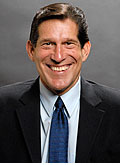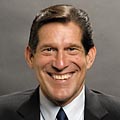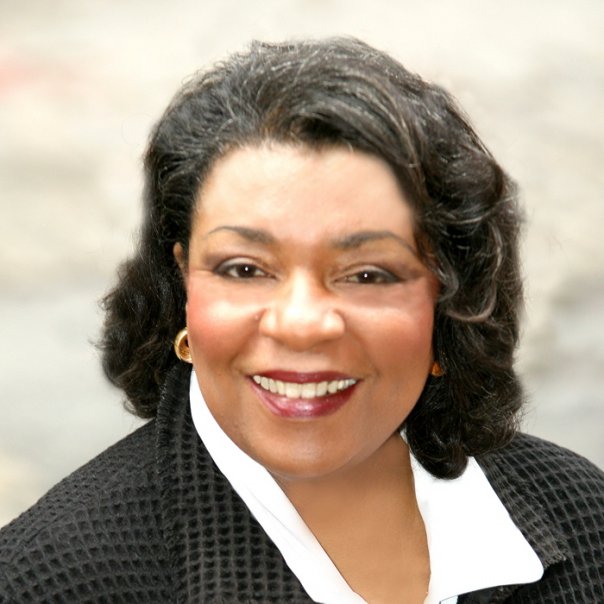What follows is an interview with Landmark Forum leader David Cunningham on the topic of health and well-being, which took place on a Syracuse radio station, WSYR AM. On the program Cunningham talks about what it takes to live a healthy life, and specifically what kinds of conversations and views of the world either stop us or empower us in achieving that. The interview is conducted by Dr. Steve Wechler.
Dr. Steve Wechsler: So this show today is a really exciting show for me because we talk so much on Natur-Tyme about health. We talk about wellness. We talk about what to do to be happy and healthy.
 And my guest today, David Cunningham, is a communication expert and seminar leader for Landmark Education, a personal and professional growth training and development company, that has trained more than 1.2 million people. Using their programs, their breakthroughs in their personal lives and their communities, community projects, Landmark’s flagship program works with some extremely big companies, companies that we’re talking about at a workshop that I went to – like Apple. Performance on parts of companies really getting along to each other so they can perform at their highest, and that people have great relationships and overall satisfaction in their lives. David, you on?
And my guest today, David Cunningham, is a communication expert and seminar leader for Landmark Education, a personal and professional growth training and development company, that has trained more than 1.2 million people. Using their programs, their breakthroughs in their personal lives and their communities, community projects, Landmark’s flagship program works with some extremely big companies, companies that we’re talking about at a workshop that I went to – like Apple. Performance on parts of companies really getting along to each other so they can perform at their highest, and that people have great relationships and overall satisfaction in their lives. David, you on?
David Cunningham: I am, Steve. Good morning.
Dr. Steve Wechsler: Great. Good morning, David. Thank you so much for being on today. I really appreciated meeting you the other day and also learning about more of what your company and the style of communication can do for a topic like we’re talking about today which is weight loss. We hear about people – you know, so much obesity going on among adults, and especially concerning people as obesity among children.
David Cunningham: It certainly is and it’s really important that we find some new ways of making a difference in that area.
Dr. Steve Wechsler: Yeah. We have to change. As it says here, we have to change the conversation about it. There’s so many things out there. I mean, I can ask so many of my patients. They’re looking to me for advice, and I’m like, “Well, what do you think you should do?” So many people know what to do but they can’t wrap their heads around actually doing it. There’s something obviously getting in the way.
David Cunningham: That’s right. You know, we talked a lot about junk food. Well, there’s something else we could – which we could call junk talk. Right, Steve, which is where the speaking we do, the conversations we have about what we eat and about our fitness – if we pay attention to what we’re actually saying, we’ll find that a lot of the conversations we have with other people and with ourselves privately – the conversations themselves disempower us, and defeat us in all of our health commitments.
Dr. Steve Wechsler: Yeah. Conversations are important because a lot of the conversation goes on inside our heads and the conversation kind of out in the public – like the big thing is school children. You know, the conversation is, “You know, get them fit, get them healthy,” and, you know, they’re canceling gym and they cancel outings and they serve sometimes really lousy food. So the conversation doesn’t match what’s really happening in the world.
David Cunningham: Yeah. I think there’s both pieces of it, right? So let’s talk about the conversations people have with themselves first, okay? I don’t think people really realize how much they talk to themselves. There’s that voice in the back of our heads, and it’s as common as breathing. If we’re breathing, we’re talking to ourselves, and that little voice in the back of our head is just always commenting on everything. One of the things it comments on is our health and our fitness. Food, eating, exercise, and way back when we’re young, we make some decisions. Decisions like, “I’m not good at that. I’m not good at exercise, or I’m not good at running, or I’m not good at basketball, or exercise is hard.” Or, with regard to eating, we make decisions like, “Oh, I deserve to eat what I want to eat.” And those decisions keep playing over and over again in our heads. We tell ourselves that over and over again, and that’s what defeats us in our biggest commitments to being healthy.
Dr. Steve Wechsler: You know, that’s very funny. Yesterday I went to a 30th anniversary of a camp reunion of the kids that we were in the same cabin together when we were 11, 12, 13 years old, and so much was locked in even by then, and when we’re sitting around we’re like, “Oh, my God. We’re no different in some ways than we were back then.” A lot of the same habits, a lot – you could see the eating habits even among us. The picky eater was the vegan. The guy who couldn’t stop eating is, you know, 200 pounds overweight. It was just amazing how things moved forward without much change.
David Cunningham: That’s because, Steve, that the actions we take are always correlated to – consistent with – the conversation we’re having with ourself. So, for instance, if we say, if one of the things we say to ourselves is, “Uh, you know, eating – when I’m tired – it makes it feel better to eat,” and that’s one of the things we’ve decided, or, “When I’m sad, it makes me feel better to eat,” and that’s one of the things we’ve decided, way back when we were kids, that our actions, no matter what else we get committed to, will be consistent with that fundamental decision we made. And until we can get those decisions revealed and make some new decisions, we really won’t change our actions no matter how much we try.
Dr. Steve Wechsler: You know, it’s funny. I went to a conscious eating seminar and they said, “You know, don’t eat when you’re sad. Don’t eat when you’re upset. Don’t eat when you’re too excited. Don’t.” And people are like, “When do you eat?” You know, the conversation like you’re talking about in our heads is going off on so many different subjects that we’re not necessarily choosing what to eat. Sometimes it’s like, you know, you eat, and then you look down and go, “Wow. My plate’s empty. I must need more.” We’re not present when we’re eating.
David Cunningham: That’s good, and that’s why it’s all so important, then, to start some new, proactive conversations. Conversations that are really based in what you’re committed to. There’s two kinds of conversations, if you noticed. There’s one kind which is where we talk about how come we can’t do things. Like, “Oh, I can’t stick to a diet ‘cause I travel so much, or I can’t really exercise ‘cause I’m too busy.” That’s one kind of conversation.
There’s another kind of conversation where we actually commit to something. Make some new promises about things that we’ll do and include other people in that, which is a really key part, so –
Dr. Steve Wechsler: That’s a very key part.
David Cunningham: It is. Conversations like this. “Will you go running with me?” Or, how about, “Would you want to try this diet with me?” And when you start new conversations that actually include other people and literally the conversation itself invites people into a new lifestyle with you. Those conversations in particular make a difference.
Dr. Steve Wechsler: And to invite people. A friend of mine is living with me and she gets up really early in the morning, exercises, does her thing, and that was a really good person for me to ask because she has that kind of lifestyle already. But to ask someone who’s as lazy, maybe, as you are, would that be as good as asking someone who maybe has some habits going already that are positive?
David Cunningham: Well, I think that one of the things people do is that we often talk each other out of something. So you and I may in the evening go, “Okay, let’s run tomorrow.” Then we wake up in the morning and I look at you and go, “Uh, I don’t know. I’m tired.” You go, “Me, too.” We go, “Okay. Well, forget it.” And we talk each other out of things. So it’s really important that whoever you’re with, whoever you’re engaging with, you start a relationship where you talk each other into things versus out of things. That’s really important.
Dr. Steve Wechsler: Right. And making a commitment and showing up for that commitment can really change your whole life, not even just about committing to running.
David Cunningham: Well, I think that’s right. I don’t think people really have tapped into as much as they could the power of committing or the power of making new, big, bold promises. A lot of people are afraid to make promises or commitments. For two reasons. One is because they’re somewhat embarrassed. You know, if they’ve broken their promises or commitments before. If they said, “I’m going to go on a diet,” and then they haven’t before, then they’re embarrassed to say it again.
Or, their other reason that people don’t like to make promises or commitments is because they’re afraid they won’t keep them. But that’s really the point of a promise. A promise of a commitment is not a prediction. A prediction is when you say, “I think this will happen, or I think that won’t happen.” A promise is or a commitment is when you say, “I’m going to have something happen that’s new, that wasn’t going to happen anyway.” And saying that, and saying it to other people, and, in fact, the more people you say it to, the more power it gives you.
Dr. Steve Wechsler: Now, what about connecting people up with – you know, I used to do a lot of work with people who smoked, and we would have them write on little cards, give it to your friend. “Hey. I’m stopping smoking. Give me a call. Can I use you as one of my supports?” and also having them saying, “Well, what if I keep smoking? What could be the outcome of that?” Or, “What if I don’t stop at a certain time, or what if I stop now? What are the positive outcomes?”
David Cunningham: I think that’s really valuable and, you know, one of the things we have to face, though, too, is that no matter how much education we’ve done on the consequences of different things – of smoking or eating certain kinds of foods or not exercising – just hearing the consequences alone doesn’t seem to make a difference for people. And I think that goes back to the other point you made, which is that people’s actions, our actions, are always correlated to the conversations we’re having with ourselves and others, and unless we alter the conversations we’re having, we really won’t alter the behavior.
Here is the next part of the interview.




4 comments
hi ! I am a landmark graduate. this article has come to me at the right time….. I was looking for a breakthrough in this specific area. Thankyou so much……
[…] This is the second part of a radio interview with Landmark Forum leader David Cunningham about health and well-being. Dr. Steve Wechler of WSYR AM conducts the interview. Here is part one. […]
Reading the interview I could identify several conversations I have with myself everyday… Thanks for the extra impulse.
I’m reminded of the Landmark Forum point about Being Powerful (create alignment with others using requests, invitations, and promises). My breakthrough today is that I must do that with myself too. If we break promises we make to ourselves, what credibility do we have in making promises to others?